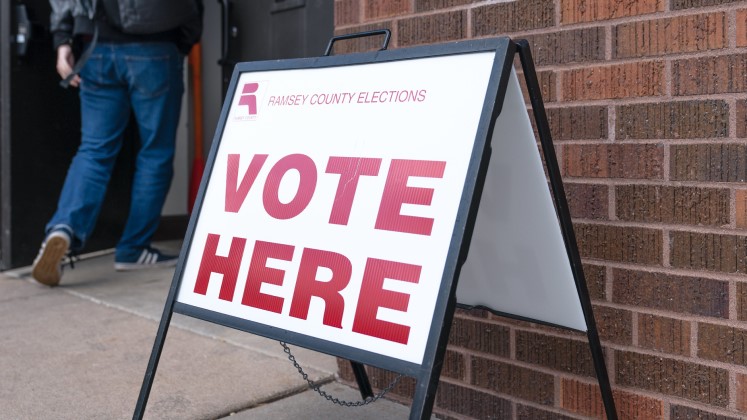In 2018, we published more than 350 articles covering the entire range of United States politics, policy, and society. Here’s a count-down of the ten most popular articles we published this year.
10. Why “sex” may not be the best way to understand the gender gap in political behavior (1,489 pageviews)

 Election coverage often refers to a “gender gap”, meaning different vote choices between women and men. But such references are in fact talking about differences by sex. But does how we measure gender influence what we can say about people’s political preferences? In new research, Amanda Bittner and Elizabeth Goodyear-Grant used surveys to capture people’s subjective gender identity, and then examined respondents’ attitudes based on these reported identities. They find that not all women are the same, and neither are men: people’s idea of their own gender does not always fit with their sex, and their political attitudes are also based on where they consider themselves to be on the gender scale.
Election coverage often refers to a “gender gap”, meaning different vote choices between women and men. But such references are in fact talking about differences by sex. But does how we measure gender influence what we can say about people’s political preferences? In new research, Amanda Bittner and Elizabeth Goodyear-Grant used surveys to capture people’s subjective gender identity, and then examined respondents’ attitudes based on these reported identities. They find that not all women are the same, and neither are men: people’s idea of their own gender does not always fit with their sex, and their political attitudes are also based on where they consider themselves to be on the gender scale.
9. Why has the US opioid crisis not spread to the UK? Thank the NHS (1,632 pageviews)

 The US is currently experiencing an epidemic of opioid use – a crisis which has yet to cross the Atlantic to the United Kingdom. But why has opioid use reached crisis point in the US but not in the UK? Diarmuid Denneny and Silvie Cooper argue that the US crisis has its roots in the promotion of opioids for chronic pain management more than 20 years ago which led to a culture of attempting to end chronic pain rather than to manage it. The National Health Service in the UK, by contrast, made pain management services universally accessible and offers pain-management strategies beyond opioids.
The US is currently experiencing an epidemic of opioid use – a crisis which has yet to cross the Atlantic to the United Kingdom. But why has opioid use reached crisis point in the US but not in the UK? Diarmuid Denneny and Silvie Cooper argue that the US crisis has its roots in the promotion of opioids for chronic pain management more than 20 years ago which led to a culture of attempting to end chronic pain rather than to manage it. The National Health Service in the UK, by contrast, made pain management services universally accessible and offers pain-management strategies beyond opioids.
8. Donald Trump’s presidency has a disturbing parallel in the political career of Huey Long (1,642 pageviews)
 Donald Trump is not the first American politician to achieve power through demagoguery and then to use that power for their own gain. Adrian Mercer looks back to the political career of Louisiana Governor, then Senator, Huey P Long. He writes that the parallels between Trump and Long are striking: both won elected office by presenting themselves as outsiders promoting reform, and both supported the established order once they gained power. Prior to his assassination in 1935, investigations and corruption charges had begun to undermine Long’s power; President Trump now faces similar challenges which may be the undoing of his presidency.
Donald Trump is not the first American politician to achieve power through demagoguery and then to use that power for their own gain. Adrian Mercer looks back to the political career of Louisiana Governor, then Senator, Huey P Long. He writes that the parallels between Trump and Long are striking: both won elected office by presenting themselves as outsiders promoting reform, and both supported the established order once they gained power. Prior to his assassination in 1935, investigations and corruption charges had begun to undermine Long’s power; President Trump now faces similar challenges which may be the undoing of his presidency.
7. Maryland’s electoral maps show how proportional representation could solve the problem of gerrymandering (1,740 pageviews)



 This week the US Supreme Court hears a case concerning the constitutionality of partisan gerrymandering in Maryland. Examining current, past, and alternative electoral maps, Alex Keena, Michael Latner, Anthony J. McGann, and Charles Anthony Smith find that by making districts more competitive, some redistricting plans can actually work against one party or the other. Only the introduction of proportional representation with multi-member districts, they argue, would mean a truly fair electoral system for Maryland.
This week the US Supreme Court hears a case concerning the constitutionality of partisan gerrymandering in Maryland. Examining current, past, and alternative electoral maps, Alex Keena, Michael Latner, Anthony J. McGann, and Charles Anthony Smith find that by making districts more competitive, some redistricting plans can actually work against one party or the other. Only the introduction of proportional representation with multi-member districts, they argue, would mean a truly fair electoral system for Maryland.
6. Women and men receive different punishments for their involvement in the same crime: prostitution. (1,925 pageviews)
 In a new study of nearly 23,000 people who had been arrested only once, and for prostitution, Rebecca Pfeffer finds significant disparities in how men and women had been treated. Men, who tend to be the buyers, were less likely to be arrested compared to women, and were also less likely to be given a jail sentence. The way in which prostitution laws are enforced, she writes, disproportionately harms women and raises questions about the concept of all being equal before the law.
In a new study of nearly 23,000 people who had been arrested only once, and for prostitution, Rebecca Pfeffer finds significant disparities in how men and women had been treated. Men, who tend to be the buyers, were less likely to be arrested compared to women, and were also less likely to be given a jail sentence. The way in which prostitution laws are enforced, she writes, disproportionately harms women and raises questions about the concept of all being equal before the law.
5. What do Republicans and Democrats think about climate change? It depends on where they live (2,131 pageviews)



 As with most political issues, neither Republicans nor Democrats are completely against or in favor of action to tackle climate change. In new research Matto Mildenberger, Peter Howe, Jennifer Marlon, and Anthony Leiserowitzinvestigate how support for climate action varies from state to state for both party’s supporters. They find that the belief that global warming is happening as well as support for particular climate mitigation policies varies widely across both states and congressional districts. Many Republicans, for example, believe that global warming is happening, but not that it is human-caused. Such contradictory beliefs, however, do not seem to affect Republicans’ support for funding research on renewables or even the regulation of carbon pollution.
As with most political issues, neither Republicans nor Democrats are completely against or in favor of action to tackle climate change. In new research Matto Mildenberger, Peter Howe, Jennifer Marlon, and Anthony Leiserowitzinvestigate how support for climate action varies from state to state for both party’s supporters. They find that the belief that global warming is happening as well as support for particular climate mitigation policies varies widely across both states and congressional districts. Many Republicans, for example, believe that global warming is happening, but not that it is human-caused. Such contradictory beliefs, however, do not seem to affect Republicans’ support for funding research on renewables or even the regulation of carbon pollution.
4. How a cultural revolt against “political correctness” helped launch Trump into the presidency (2,221 pageviews)
 Donald Trump’s 2016 election victory in part reflected deep cultural opposition to Political Correctness (PC) norms. People dislike being told that they are not allowed to speak their mind, and Donald Trump represented a cultural foil to express that frustration. New research from Lucian Gideon Conway III, which studies the 2016 election campaign, shows that a sample of moderate Americans were influenced to support Trump by a brief mention of the PC movement, even though the PC movement was framed positively and the discussion had nothing directly to do with either candidate. Taken together, these results suggest that we need to look beyond simple markers of ideology to understand the Trump phenomenon – part of his support stems from a cultural revolt against Political Correctness.
Donald Trump’s 2016 election victory in part reflected deep cultural opposition to Political Correctness (PC) norms. People dislike being told that they are not allowed to speak their mind, and Donald Trump represented a cultural foil to express that frustration. New research from Lucian Gideon Conway III, which studies the 2016 election campaign, shows that a sample of moderate Americans were influenced to support Trump by a brief mention of the PC movement, even though the PC movement was framed positively and the discussion had nothing directly to do with either candidate. Taken together, these results suggest that we need to look beyond simple markers of ideology to understand the Trump phenomenon – part of his support stems from a cultural revolt against Political Correctness.
3. Women voted for Donald Trump for the same reasons men did – racism and sexism (2,894 pageviews)

 On Election Day 2016, 40 percent of American women voted for Donald Trump, despite his well-known history of sexual misconduct. In new research, Mark Setzler and Alixandra B. Yanus examine the attitudes of Trump’s women voters to try to understand more about why so many voted for the now-President. They find that the attitudes of Trump’s women voters were no different than men’s: even more than partisanship, both groups were influenced by sexism and racial resentment.
On Election Day 2016, 40 percent of American women voted for Donald Trump, despite his well-known history of sexual misconduct. In new research, Mark Setzler and Alixandra B. Yanus examine the attitudes of Trump’s women voters to try to understand more about why so many voted for the now-President. They find that the attitudes of Trump’s women voters were no different than men’s: even more than partisanship, both groups were influenced by sexism and racial resentment.
2. We Don’t Know How Democracies Die (2,940 pageviews)

 Since the election of Donald Trump, many have expressed their concern that the United States could slip into an authoritarian backslide. Emily Holland and Hadas Aron react to this claim, most notably asserted in Steven Levitsky and Daniel Ziblatt’s new book, ‘How Democracies Die,’ noting that the decline of one of the most stable, long-lasting democracies in the world can only be compared to the decline of other lasting, consolidated democracies, of which there are none.
Since the election of Donald Trump, many have expressed their concern that the United States could slip into an authoritarian backslide. Emily Holland and Hadas Aron react to this claim, most notably asserted in Steven Levitsky and Daniel Ziblatt’s new book, ‘How Democracies Die,’ noting that the decline of one of the most stable, long-lasting democracies in the world can only be compared to the decline of other lasting, consolidated democracies, of which there are none.
1. Evidence suggests the militarization of police forces leads to more civilian deaths. (2,977 pageviews)
 Why do some police officers resort to lethal force so quickly? In new research, Edward Lawson Jr finds that this growing tendency is closely linked to the increasing militarization of American law enforcement. A more militarized worldview, he writes, leads to police departments acquiring more military equipment and pushes officers towards the use of lethal force instead of other, potentially non-lethal, options.
Why do some police officers resort to lethal force so quickly? In new research, Edward Lawson Jr finds that this growing tendency is closely linked to the increasing militarization of American law enforcement. A more militarized worldview, he writes, leads to police departments acquiring more military equipment and pushes officers towards the use of lethal force instead of other, potentially non-lethal, options.
Shortened url for this article: https://bit.ly/2VeeBd0






